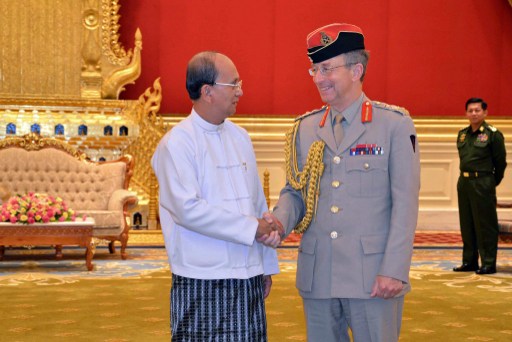The British government has defended its plans to offer military training to the Burmese army, despite revelations that the course may cover the “art and science of war” and “border security” management.
Speaking to DVB on Thursday, the UK’s new ambassador to Burma, Andrew Patrick, described the training as an “important” part of Britain’s re-engagement with Burma and insisted that it would not help the combat ability of the armed forces.
“It’s important that we have a relationship with the Burmese military, because in the UK we have a military that’s respected, strong and part of the democratic system,” he said. “So it’s useful to show senior members of the military here what that looks like and give them a chance to see whether it’s helpful here in Burma.”
Thirty high-ranking officers from the Burmese army are set to attend a course entitled “Managing Defence in the Wider Security Context”, run jointly by Cranfield University and the UK Defence Academy in January 2014. The British government has repeatedly insisted that it will only focus on human rights and democratic accountability.
But a prospectus of the course available online lists modules on the art and science of war, border security and challenges to state sovereignty, while making no mention of human rights mechanisms. This has raised concerns among campaign groups, who say it could boost the army’s capacity to target ethnic minority populations in Burma.
Earlier this month, the British government turned down a freedom of information request submitted by Burma Campaign UK (BCUK) for more details about the course citing reasons of “commercial confidentiality”.
Mark Farmaner, campaigns director at BCUK, described it as an “excuse” that illustrates that the government is “nervous” about disclosing the real nature of its military relationship with Burma. BCUK is currently appealing the rejection.
“Andrew Patrick seems to be deliberately avoiding the issue,” Farmaner told DVB on Friday. “No one is saying there should be no contact at all with the [Burmese] military. The problem is that the UK has gone way beyond that and is now offering the Burmese army training in the art and science of war.”
The US and Australia have also offered military training to Burma as part of their diplomatic re-engagement with the former pariah state, which is slowly emerging from decades of iron-fisted junta rule. But these decisions have rattled ethnic minority groups, who say human rights training won’t prevent the army, known nationally as the Tatmadaw, from attacking, raping and pillaging minority communities.
[related]
“Burmese military leadership orders their officers and soldiers to violate our human rights precisely because that is the objective they aim to achieve,” warned a coalition of 133 ethnic groups in an open letter to the UK, US and Australian governments on Thursday.
The letter, signed by Kachin, Shan, Karen, Chin and other minority groups, urged western governments to refrain from all forms of military-to-military ties with Burma until its 2008 constitution — which is considered deeply undemocratic and offers legal immunity to military officers guilty of rights abuses — has been revised.
“Until Burma’s constitution and laws are changed, training the Burmese army to respect human rights is likely to be as effective as trying to train a shark not to eat fish,” said Farmaner.
The Tatmadaw has been implicated in war crimes against Burma’s ethnic minorities, which make up roughly 40 percent of the population and have been fighting the government for greater autonomy for decades.
President Thein Sein has been credited for introducing a series of democratic reforms in Burma since taking office in March 2011, including inking peace deals with 10 major ethnic armed groups. But conflict continues to flare in the country’s volatile borders, including Shan and Mon states, as well as Kachin where civil war resumed in June 2011, displacing over 100,000 people.



